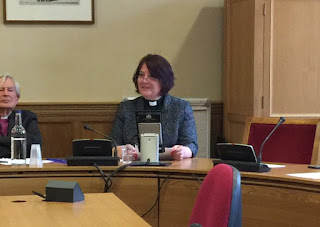Church Action for Tax Justice – Launch 17thApril 2018
Michaela Youngson
President Designate of the Methodist Conference
Chair of the London District of the Methodist Church
Tax is one of those subjects that many people in the church find it difficult to engage with – sometimes it’s because we can’t get our heads round the numbers involved or understand the legal framework we are working in, other times it is just that we find talking about money at all unpalatable – yet Jesus did not hold back when it came to talking about money or calling for justice, and the early church demonstrated an active commitment to a fair distribution of wealth.
I would like to affirm that the Methodist Church believes strongly paying tax fairly within both the letter and the intent of the law and to a best ethical approach in terms of our own investments and is working towards ensuring that the organisations we invest in and do business with demonstrate rigour and good practice.
By supporting the establishment of Church Action for Tax Justice, the Methodist Church demonstrates our commitment to working in partnership with others in campaigning for changes in the law, when the law and its application fail to deliver justice.
The most obvious reason for taxation is to pay for the services we need to enable our society to function and even flourish. As a Church leader in London and a resident in the Borough of Brent I can see first-hand how, when resources are not distributed fairly, then wider injustice is an inevitable outcome.
We know that decisions regarding public funding have a direct consequence on events on the ground. This has come sharply into focus in the last few weeks as we have heard with horror, the number of young people murdered on the streets of London. For those of us leading funerals, supporting the bereaved and cleaning up the blood from our pavements, decisions made about how to use tax revenues for public services are not a matter of theory, rather they are a matter of life and death.
Straightforward questions about the number of police and community support officers on our streets are being asked. Questions about the eradication of publically funded youth work, the pressure on mental health services in particular and the NHS in general are being asked. The answers offered are not straightforward and the ideal of subsidiarity becomes a means of passing the blame to local decision makers, whilst ceasing to pass them the bucks they need to meet the needs of their communities in a fair and well-resourced way.
According to Trust For London's Poverty profile, 37% of children in London and 42% in inner city boroughs, live below the poverty line.[1]For this to be true in the capital city in one of the world’s six richest nations is a disgrace.
When we link the words ‘tax’ and ‘justice’ we move from a neutral ethical position to an engagement with inequalities, not just in London of course, but across the UK and globally. Good, ethical tax policies support people in times of need and allows them to contribute to building communities in which all can flourish.
My hope for Christian Action on Tax Justice is that it will help churches to understand the gospel-inspired call to justice, through fair taxation, that can lift people from the traps of inequality and exclusion. I hope we can shift the narrative around tax away from it being a dirty word, or a necessary evil, but rather a blessing and a means of all citizens having a stake in a generous society that cares for all.


No comments:
Post a Comment